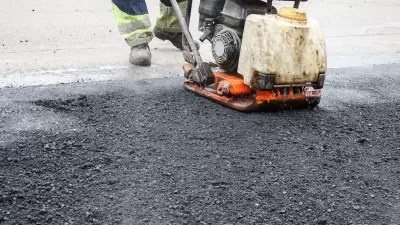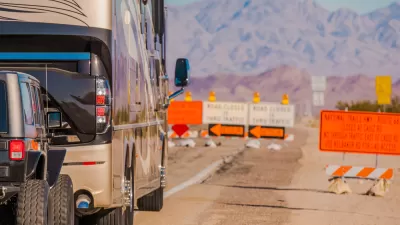Texas State Rep. Joe Pickett faults a recent TRIP report for not recommending a funding strategy to address the state's revenue shortfall for transportation needs. Two groups view vehicle registration fees as a funding option.
Nick Swartsell writes how a key state representative, a transportation advocacy group, and an influential business association have received TRIP's report, Future Mobility in Texas: The Cost of Meeting the State's Need for Safe and Efficient Mobility (PDF). TRIP, a D.C.-based non-profit transportation research group "is sponsored by insurance companies, equipment manufacturers, distributors and suppliers, businesses involved in highway and transit engineering and construction, labor unions, and organizations concerned with an efficient and safe surface transportation network." [I could not find what the acronym stands for].
State Rep. Joe Pickett, D-El Paso, who sits on the House Transportation Committee, says the TRIP report is not a revelation, citing similar studies by the Texas Department of Transportation and other organizations. "They still don't address the main issue," Pickett said, "and that's how we're going to pay for it." Pickett says that the lack of public awareness and an unwillingness to take some politically unpopular actions are the main reasons for funding shortfalls.
Lawrence Olsen, executive vice president of Texas Good Roads, an 80-year-old advocacy group composed of "business people, community leaders, chamber of commerce members, professionals and transportation experts," and not affiliated with the TRIP study, noted "that major revenue sources for the highway fund haven't been update [sic] to reflect increased road usage. Olsen cited the vehicle registration fee, which was last increased in 1985, and the motor fuels tax, which was saw its last bump in 1991."
"In a statement released (Oct. 2), the Texas Association of Business said it would push for a $50 increase in the fee motorists pay to register a vehicle in Texas during the upcoming legislative session. It suggests the revenues raised by this increase could be leveraged to raise $16 billion in bonds for road improvements.
TAB CEO Bill Hammond said in the statement, "if you look at the TRIP study the cost of doing nothing is far higher. We see the registration fee increase as the only real alternative right now."
The state's transportation funding crisis will be addressed at the state Transportation Summit on Oct. 18. Organizers are well-aware of the funding shortfall, as they note in the Summit's description.
"Texas is facing a transportation crisis. The state will run out of money for new roads by September 1, 2013. We will only have enough money to maintain the roads we already have, and we will soon run short of money to even do that. Gas taxes no longer cover the dollars needed. We are adding over 30,000 new vehicles to Texas roads every month."
Thanks to Len Conly
FULL STORY: Study: Inadequate Roads Cost Texans Billions

Maui's Vacation Rental Debate Turns Ugly
Verbal attacks, misinformation campaigns and fistfights plague a high-stakes debate to convert thousands of vacation rentals into long-term housing.

Planetizen Federal Action Tracker
A weekly monitor of how Trump’s orders and actions are impacting planners and planning in America.

San Francisco Suspends Traffic Calming Amidst Record Deaths
Citing “a challenging fiscal landscape,” the city will cease the program on the heels of 42 traffic deaths, including 24 pedestrians.

Defunct Pittsburgh Power Plant to Become Residential Tower
A decommissioned steam heat plant will be redeveloped into almost 100 affordable housing units.

Trump Prompts Restructuring of Transportation Research Board in “Unprecedented Overreach”
The TRB has eliminated more than half of its committees including those focused on climate, equity, and cities.

Amtrak Rolls Out New Orleans to Alabama “Mardi Gras” Train
The new service will operate morning and evening departures between Mobile and New Orleans.
Urban Design for Planners 1: Software Tools
This six-course series explores essential urban design concepts using open source software and equips planners with the tools they need to participate fully in the urban design process.
Planning for Universal Design
Learn the tools for implementing Universal Design in planning regulations.
Heyer Gruel & Associates PA
JM Goldson LLC
Custer County Colorado
City of Camden Redevelopment Agency
City of Astoria
Transportation Research & Education Center (TREC) at Portland State University
Jefferson Parish Government
Camden Redevelopment Agency
City of Claremont





























